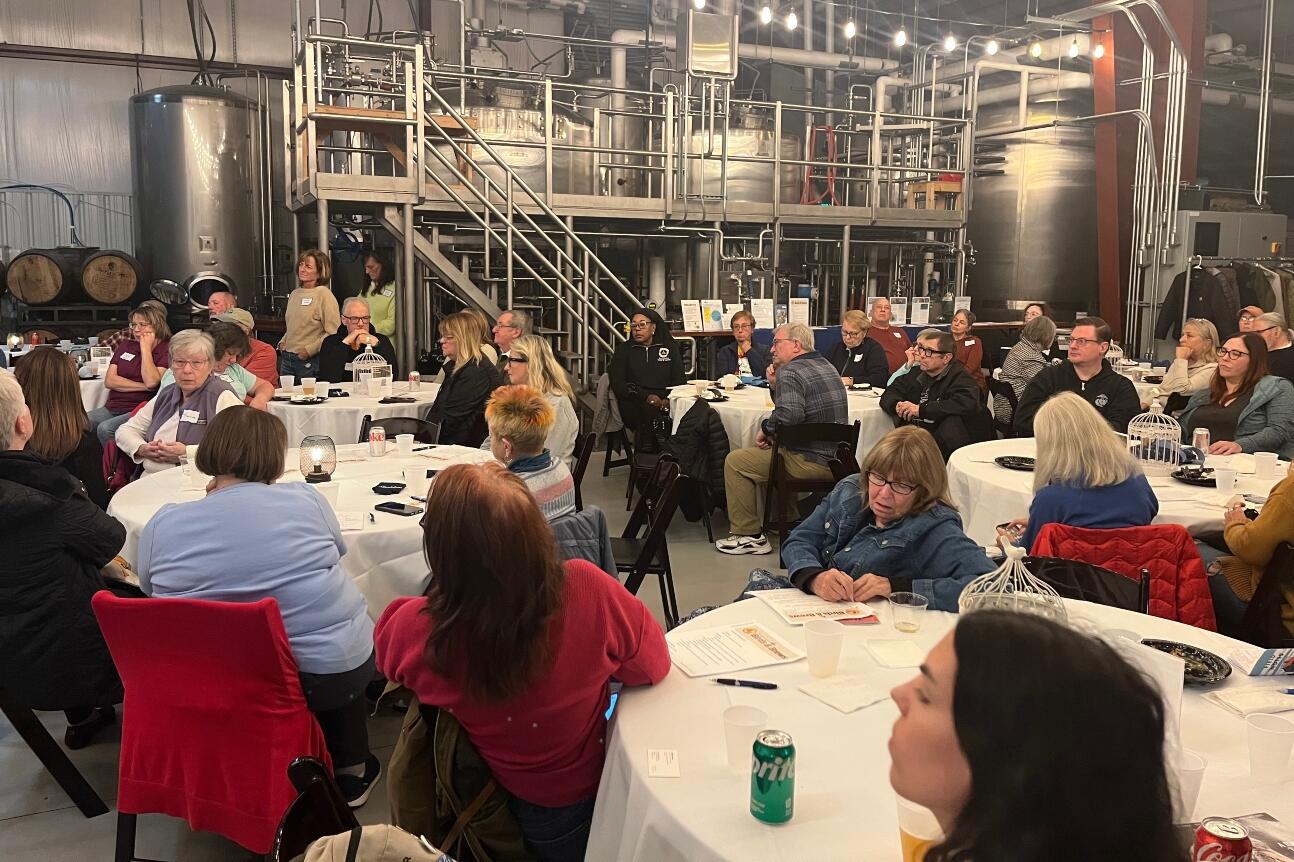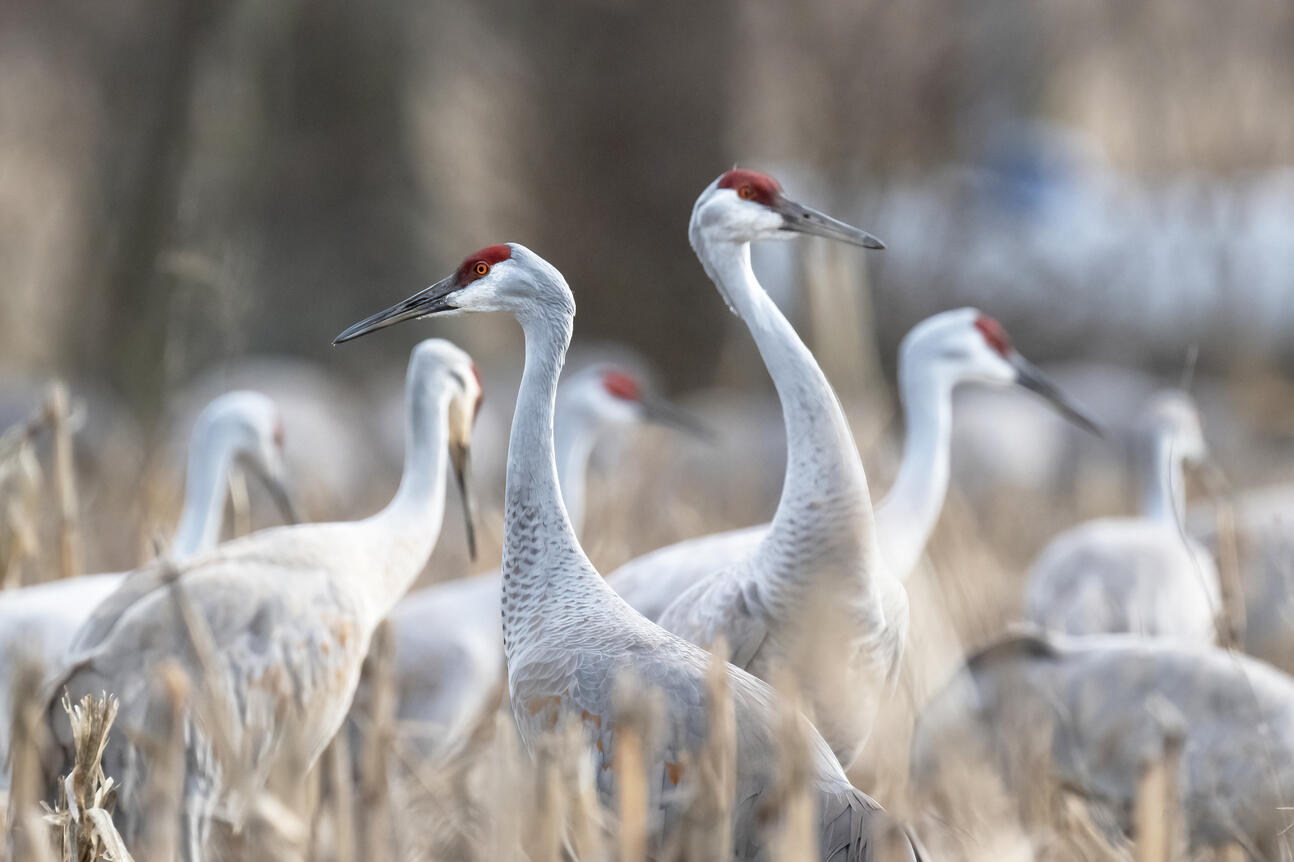(November 19, 2024) This month, Sandhill Cranes are descending on Northwest Indiana by the thousands, transforming the Jasper-Pulaski Fish and Wildlife Area into one of the most breathtaking natural sights of the year. It’s a spectacle you truly must see to believe—and it’s also a stark reminder of what’s at stake for Indiana’s wildlife.
On Tuesday, November 12, over 60 residents from across Northwest Indiana gathered at Byway Brewing in Hammond, Indiana, for Birds and Brews, a community event hosted by Audubon Great Lakes and Dunes-Calumet Audubon Society, to learn about policy efforts that are critical to protecting local birds and their habitats.
We are in a critical moment for birds and people. Indiana ranks fourth in the nation for wetland loss and two-thirds of North American bird species at risk of extinction due to climate change.
The event featured local experts who are working to protect Indiana’s birds and landscapes and leading the charge for environmental change in Indiana, including Harshini Ratnayaka, Advocacy Coordinator for Save the Dunes; Stephanie Beilke, Senior Manager of Conservation Science, Audubon Great Lakes and Dan Boritt, Executive Director for the Indiana Wildlife Federation.
Wetlands Protections

Experts shared the need to protect wetlands which are incredibly important natural areas for birds and our communities. Wetlands provide habitat to birds like the Sandhill Crane. It’s an amazing experience to hear the loud, trilled calls of a flock of Sandhill Cranes gather in Northwest Indiana. Efforts to conserve wetland areas have helped to greatly expand their numbers after overhunting caused the Midwest sub-species to plummet to just two dozen nesting pairs in the mid-twentieth century.
Wetlands hold onto an incredible amount of floodwater, helping to protect local communities. They also act as filters, helping to keep our water clean, and store carbon to keep it out of our atmosphere.
The Calumet region of NW Indiana has been identified by Audubon scientists as one of the 12 most important coastal wetland regions across the Great Lakes that are critical to conserve or restore for vulnerable marsh birds. Protecting wetlands just makes sense, and Indiana residents agree. Polling released by Audubon Great Lakes found that 94 percent of Indiana voters believe that state leaders should either strengthen or maintain Indiana’s current wetlands protections, and nearly three-quarters of voters (74 percent) favor expanding the use of renewable energy sources.
Addressing Climate Change

Sandhill Cranes depend on key stopover sites, like Jasper-Pulaski, which makes them particularly vulnerable to loss of habitat by climate change. If global temperatures continue to rise at the current rate, most Sandhill Cranes will be pushed north and out of the conterminous 48 states during the breeding season to find favorable homes.
During the Birds and Brews, experts also shared the need to rapidly expand responsibly-sited clean energy to protect birds from climate change. One way to do this is by establishing a Community Solar Program in the state. Most people are familiar with rooftop solar, which allows homeowners to install solar panels on their rooftops, helping to save money on electricity bills. But not everyone owns their home, has a suitable rooftop, or can afford to install solar panels. Community solar offers a solution to address these barriers and allows multiple participants—residents, businesses, or organizations within a community—to pay for a share of the electricity generated from a nearby community solar project.
Take Action to Protect Indiana’s Birds
Birds spark joy and wonder for many inspiring them to learn more about the natural world and the challenges facing our planet. We’re grateful to everyone who joined us for Birds and Brews to learn about opportunities to protect the birds we love. Join Audubon Great Lakes as we work to protect Indiana’s wetlands and expand renewable energy solutions to ensure that Indiana’s birds and communities will thrive for generations to come. Sign up today to be a climate advocate and we’ll reach out with opportunities to take action.





